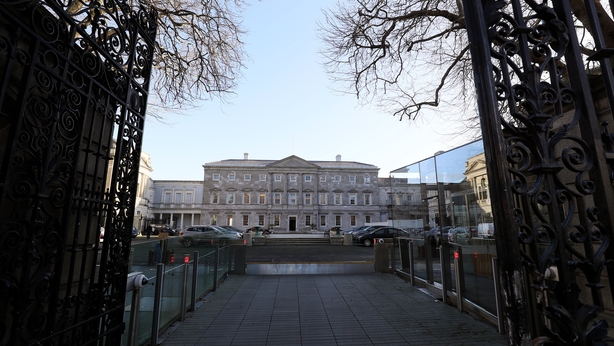The past week has seen all parties launching manifestos, explaining what they think is wrong with the way things are being run now and what they will do if elected.
These manifestos are a relatively new phenomenon in Irish politics. They were not around in the first 50 years or so when De Valera was generally running things (the word manifesto smacked of communism), but they have become common over the past 50 years. They have also tended to get longer.
Arguably they fulfil an important role in giving the electorate an opportunity to decide on the future direction of policy.
Of course, people could simply put their trust in a leader or a party. They might do so because of previous performance, or simply because that party is seen to represent people like themselves.
A party, regardless of a manifesto, will have an identity, and be seen to favour broad policy directions or philosophies.
But a manifesto, full of policy commitments, goes beyond this in promising particular solutions. In theory, voters can decide what they want done by selecting a party on the basis of its promises.
All of its TDs will have effectively signed up to this manifesto, so putting a party into office should mean it can implement its manifesto.
Problems

There are of course problems with this story.
One is that voters need to know what each party is promising. We have no direct evidence from Irish elections, but it seems unlikely that voters are very familiar with such details, and certainly not with respect to all parties running for election.
The manifestos are not distributed widely, and even if they are available online these days, relatively few people will read them. They can run to more than 50,000 words, the size of a novel.
The media cover the launches, and will refer to policy promises in their coverage of the campaign, and politicians will refer to their party's promises (and often criticise the promises made by other parties) in their speeches through the campaign.
A second problem is the willingness and ability of parties to implement their manifestos once elected.
Cynics, such as Ivan Yates, will say that all promises made by parties at election time are worthless, and that experience tells us that they are worth nothing.
If that were to be true, the above model of how democracy with parties works would be completely wrong.
There are certainly problems when it comes to acting on promises for a party that is not in government.
The Dáil may legislate but normally will do so as directed by the government, which controls a majority of votes.
Parties in opposition have little power. Even if a party is in office, it may share government with other parties who have made different promises.
Promises

Yet the evidence accumulated from Irish academic studies over the past 20 years or so, and studies elsewhere over a longer period, is that government parties do tend to do much of what they promised.
Such studies examine manifestos and identify specific pledges for actions or outcomes which are testable; that is, we can find evidence that these actions occurred or outcomes came to pass.
Recent studies by Robert Thomson and Rory Costello (which reference earlier work by Lucy Manseargh) can be found most easily in a couple of books published after recent elections: 'How Ireland voted 2007', and 'How Ireland voted 2016'.
One conclusion of these studies is that government parties do implement – at least partially – a majority of their promises.
This was true of the Fianna Fáil-led governments elected in 1997, and 2002, and the Fine Gael/Labour coalition elected in 2011.
It was not true of the Fianna Fáil-led government elected in 2007, which left over 60% of Fianna Fáil promises completely unfulfilled.
The minority parties in these government generally had a similar record to that of the largest party, although the Green Party was particularly unsuccessful in implementing its agenda in 2007-11.
Of course, parties could fulfil the less important and easier ones and ignore the big items, but that does not seem to be the case.
Costello looked at subsets of pledges identified as most important by the Irish Times in 2011, and the record on these was much the same as on the rest.
There are various reasons why some promises are not kept.
One is that, in a coalition government, parties agree to make only some things priorities. Items that make it into the Programme for Government are much more likely to be fulfilled than those that do not.
And pledges shared between partners are much more likely to make it into that programme than those which are not.
Another reason is that circumstances change, as they did in when the IMF moved in.
A third may be that parties find some promises are not so easy to keep, or that faced with advice from civil servants and pressure groups, parties decide that some policy proposals may have uncertain, undesirable, or unattractive consequences.
Patterns

A couple of other patterns are also important.
The first is that parties do not all promise the same things. In fact, promises made by one party tend not to be made by others.
There is overlap. Thus, in 2011 around a third of each party’s promises were made by another party, so here the voter has to decide who has most credibility.
This is a common feature of party competition in democracies, although it may be somewhat less common now than it has been with the rise of more extremist and populist parties.
Where promises are different, then voters can, in theory, make policy choices, although it is not possible to pick and choose: a voter can only select a package.
A second is that opposition party promises can also be fulfilled, sometimes extensively. This was most true of 2011-16, when Fianna Fáil pledges were realised to a greater degree than those of Fine Gael or Labour!
To some degree this reflects Fianna Fáil’s intention to continue to implement the austerity programme agreed with international bodies and Fine Gael and Labour failure to alter that in all the ways they suggested they would do.
More commonly though governments are more successful at doing what they promise than oppositions parties, although to be fair, parties do also talk about what they would do in government, if elected.
A third is that promises to change the status quo are less likely to be realised than those to maintain it. Voters, and parties, may want change in some areas but the status quo can be what many people want, and get.
All these analyses are of testable promises, but it may be that the electorate does not hear these, only the message behind them: we will fix this problem, we will ensure your interests are paramount, we will get the country right.
Such an interpretation will certainly mean more promises are judged to be broken: adding more hospital beds and doctors will not, in itself, ensure everyone's health needs are always met immediately, or as quickly as they would like.
Parties though, like to make concrete promises so that they can point to concrete achievements.
What about the record of the promises made by parties in 2016? This is not the place for that analysis but Rory Costello will tell all in 'How Ireland voted 2020', to be published by Palgrave in the autumn, assuming we have a government by then.







